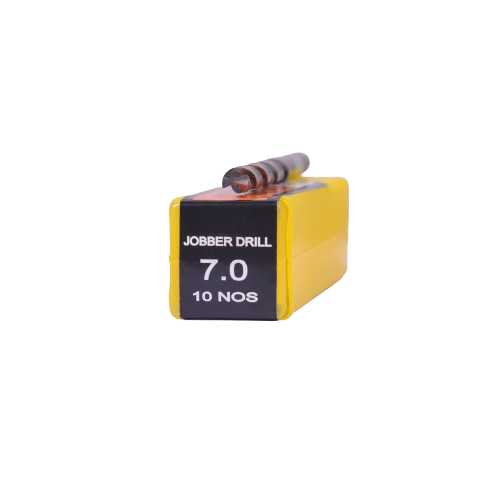
Jobber drills are one of the most commonly used types of drill bits, known for their versatility and general-purpose applications. These drills are characterized by their standard length-to-diameter ratio, typically with a flute length of around 8 to 12 times the diameter of the drill. This makes jobber drills long enough to drill deep holes while maintaining the necessary rigidity to minimize deflection during drilling. Due to this balanced length, they are often the go-to choice for a wide range of drilling tasks, from wood and plastic to metals like aluminum, steel, and softer alloys.
Typically made from high-speed steel (HSS), jobber drills are known for their durability and ability to maintain sharpness even under high-speed drilling conditions. Some versions of jobber drills are coated with materials such as titanium nitride (TiN) or cobalt to enhance performance, providing better wear resistance and heat dissipation, especially when drilling into tougher materials like stainless steel or harder alloys. The standard 118-degree point angle of most jobber drills is suitable for most applications, as it provides a good balance between cutting efficiency and strength. However, specialized jobber drills with different point angles are available for specific tasks.
The flutes of jobber drills play a crucial role in chip evacuation, ensuring that material removed during drilling is cleared from the hole efficiently. This helps prevent overheating and reduces the risk of clogging or drill breakage. While jobber drills are ideal for many general-purpose tasks, they are especially favored for tasks that require a reliable, versatile bit capable of drilling through a variety of materials without the need for frequent bit changes. They are commonly used in industries such as construction, metalworking, and automotive repair, where precision and versatility are essential.
Jobber drills come in a variety of sizes, typically following fractional, metric, or numbered sizing systems, allowing users to select the exact bit size for their specific needs. Additionally, their shank size usually matches the drill diameter, making them compatible with most standard drill chucks, including handheld electric drills and industrial drill presses. Despite their simplicity, jobber drills remain indispensable in workshops due to their adaptability and reliability, whether drilling pilot holes, completing detailed work, or performing repetitive drilling in production settings. Their balance of length, durability, and versatility ensures that jobber drills continue to be a staple tool for professionals and DIY enthusiasts alike.
WhatsApp us
